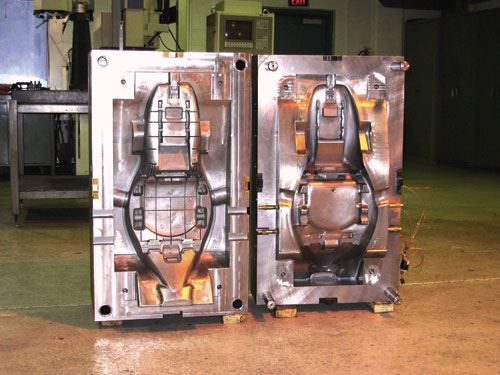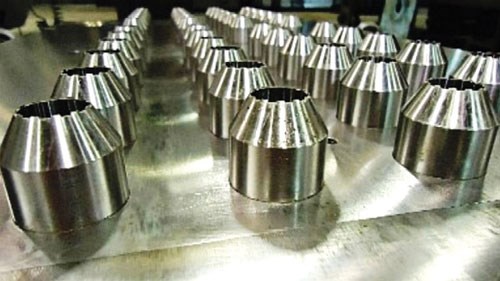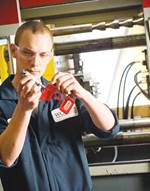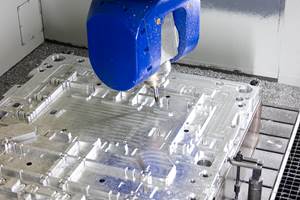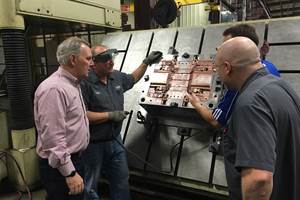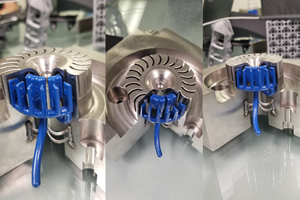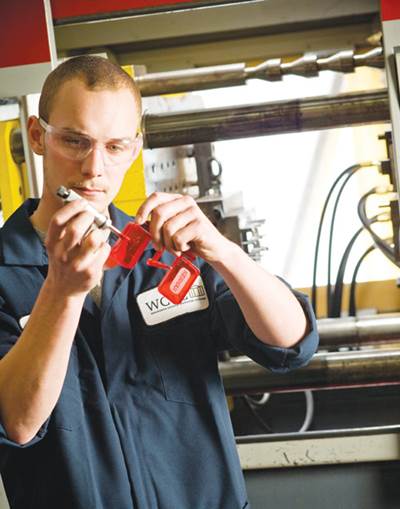Wirth Tool & Die: Ensuring Molds are “Worthy” of the Company Name
Wirth Tool & Die (Lannon, WI) has been in business since 1966 and this family-run business has survived the industry’s rocky times and credits its small but dedicated workforce and its creative vision as key to its perseverance.
Wirth Tool & Die (Lannon, WI) has been in business since 1966—providing small- to medium-size plastic injection molds and tooling as well as die cast dies to its customers in industries such as lawn and garden, consumer products, recreation, electronic/electrical, paper products and medical/pharmaceutical. This family-run business has survived the industry’s rocky times and credits its small but dedicated workforce and its creative vision as key to its perseverance.
According to Wirth Tool & Die President Randy Wirth, the company serves as the middle man between vision and product. “A few years ago we had a young gentleman come in who had an idea for which he obtained a patent,” he recalls. “He had a crude prototype, but needed some adjustments and had us do the actual mold for it. Then, he was able to have a small production run and sell his product. The whole idea, or vision, started in his mind and ended with a product. We were the middle man. His vision was realized and it felt good to be a part of it.”
Randy and his brother Brad, who serves as Vice President, have been running the company since their father Thomas—the founder of Wirth Tool & Die—retired in 1994. Randy covers all of the company’s quoting and Brad oversees the shop’s daily operations. “We have weathered many rough times through the years with slow-downs in industry and business being taken overseas,”’ Randy states. “We have persevered without cutting corners on quality. Since our products bear our name, my brother and I have worked around the clock to keep this business going through lulls and still provide our customers with the quality they expect—and deserve.”
Wirth Tool & Die is blessed with employees who are skilled, bright and committed to producing quality work, Randy notes. The company has nine to 11 employees, depending on the time of year. According to Randy, their average age is 40 years old. “We have a low turn-over,” he says. “A 20-year employee left this year to start his own business. That leaves the next longest employee at 15 years.” The company has two designers in-house, both with many years of experience.
Engineering, complete design and programming from part to product are all in-house capabilities, including mold repair. Randy notes that mold repair operations run the gamut from excessive use, improper handling; or molds made overseas that are either designed poorly or faster to repair in the U.S. versus shipping them abroad.
“The molds and dies we build are primarily one-of-a-kind,” Randy notes. “We don’t build the same molds over and over. We will build a mold that will likely take a company through tens of thousands of runs and then we may see them again if they need new inserts or have a product revision, but most of our time we are working on projects we have not worked on before. Thus, the design, programming, machining and building are new undertakings each time.”
In addition to trying to stay competitive with foreign markets and the rising costs in materials, tooling and components by offering quicker delivery times and a quality mold, Wirth
Tool’s biggest challenge is finding additional skilled employees to grow the business. “Many left this trade years ago and are now working in different careers,” Randy says. “It can take years to train someone who has never done this. The only way to solve this is for more people to learn this trade again.” For example, Wirth had difficulty finding someone with sinker EDM skills. “Finding people with EDM experience is hard and with sinker EDM skills is even harder,” he laments. “Most of those skilled in EDM only have wire experience. It has become the equivalent of the needle in the haystack.”
Enter Waukesha County Technical College (WCTC). Approximately 15 years ago, Randy and Brad began taking apprentices from WCTC, as they were both WCTC apprentices/graduates. “We believe in this program because it worked for us,” Randy notes. “We work with WCTC instructor Bob Novak, who knows which students are taking well to the program and have a desire to learn. We believe in providing an opportunity for the right student to learn while being employed.”
When the student has completed his/her 10,400 hours of employment in the trade with on-the-job training, as well as their school requirements, they will have earned “Journeymen” status in the industry, which commands a higher wage and has an accepted standard of knowledge at this level, according to Randy. Currently Wirth Tool has five “seasoned” apprentices and one new one.
When Wirth Tool is ready to add more experienced talent in areas like operation, programming and set-up skills for CNC machining centers, and sinker EDM operators with programming and set-up capability to the shop floor, the company uses Craigslist. The office manager writes the ads that say the company is looking for “experienced operators with programming and set-up skills.” Wirth Tool also uses the Job Center of Wisconsin, a website where people visit to look for jobs; and Wisconsin TechConnect, another website comprised of Wisconsin’s 16 technical colleges where people can seek out jobs.
Randy believes Wirth Tool offers a “competitive wage and benefits” similar to shops like his—that is adjusted to the experience and the skill level of the person seeking employment. “We will pay more for proven skills,” he notes.
Over the past year, the company has upgraded its equipment with the additions of four new computers, new design software and new CNCs, and is currently looking to add one more CNC machine.
Additionally, the company is looking to expand its customer base. “This often happens by word-of-mouth and networking with our existing customers,” Randy notes. Wirth Tool belongs to the American Mold Builder’s Association (AMBA), the National American Die Casting Association (NADCA) and the Lannon Business Association. Randy says exhibiting in a trade show may be in Wirth Tool’s future, depending on cost.
Randy is thankful business has been steady the past year, and credits a great deal of that to the work coming back to the United States and his dedicated workforce. “We approach each job as if our reputation depends on it, because it does.”
For More Information:
Wirth Tool & Die / (262) 251-8630
barbaral@bizwi.rr.com / wirthtoolanddie.com
Waukesha County Technical College / (262) 695-6500 / rnovak@wctc.edu / wctc.edu
Related Content
True Five-Axis Machine Yields More Throughput, Greater Productivity
CDM Tool & Mfg. Co. LLC increased shop capacity thanks to a versatile high-speed/high-accuracy five-axis Fooke mill capable of cutting very large workpieces quickly and accurately with fewer setups.
Read MoreOEE Monitoring System Addresses Root Cause of Machine Downtime
Unique sensor and patent-pending algorithm of the Amper machine analytics system measures current draw to quickly and inexpensively inform manufacturers which machines are down and why.
Read MoreFive-Axis Vertical Mill Increases Mold Shop Capacity by Reducing Setups
Zero Tolerance now processes blocks — from squaring to waterline drilling to rough and finish milling — on a single five-axis CNC mill, reducing setups and moving blocks in/out of multiple machines without sacrificing accuracy and surface finish.
Read MoreLarge Hybrid Steel Insert Solves Deformation, Dimensionality, Cycle Time Problems
DMLS printers using metal additive powders selected by Linear AMS to produce high-quality, accurate, consistent 3D-printed mold components with certification and traceability.
Read MoreRead Next
Waukesha County Tech College: Industry Support Strengthens Curriculum
WCTC’s administration has always supported the tool and die program with the latest equipment and technology.
Read MoreHow to Use Continuing Education to Remain Competitive in Moldmaking
Continued training helps moldmakers make tooling decisions and properly use the latest cutting tool to efficiently machine high-quality molds.
Read MoreHow to Use Strategic Planning Tools, Data to Manage the Human Side of Business
Q&A with Marion Wells, MMT EAB member and founder of Human Asset Management.
Read More
